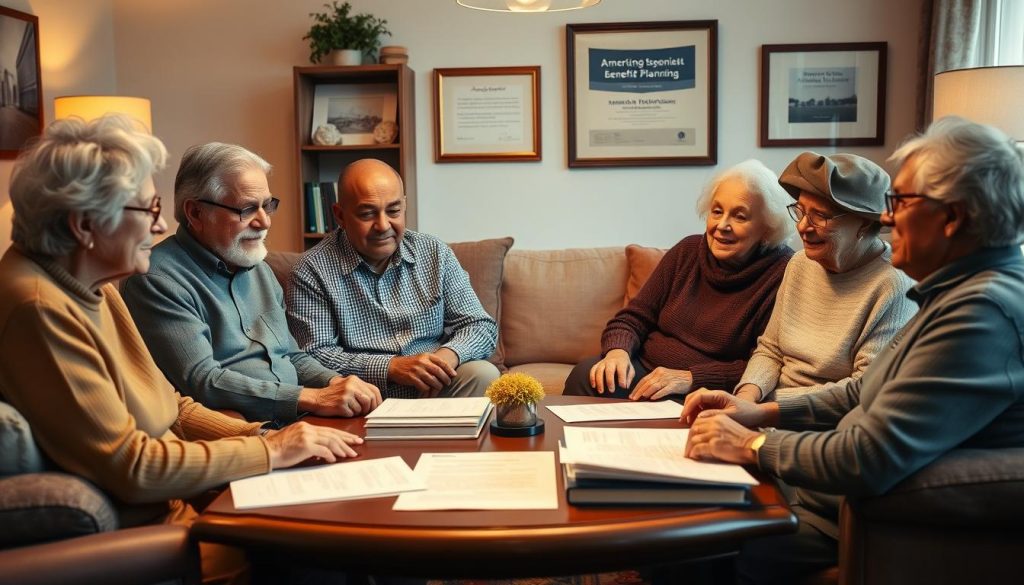Did you know almost half of people over 55 don’t have a will? This means trouble for their families. Making a plan for your estate helps your family after you’re gone. It avoids long court times and extra costs. A good plan keeps up to 10% of your estate’s value from getting lost in probate1. Sadly, just 32% of Americans have an estate plan2.
Key Takeaways
- Estate planning is essential for seniors, providing clarity and direction in times of loss.
- Nearly half of Americans over 55 lack a will, highlighting a significant gap in preparedness.
- Probate can consume up to 10% of an estate’s value and take one to two years to finalize.
- The average cost for professional estate planning services can vary widely, influencing many to opt for online solutions.
- Health care power of attorney is critical, especially since 1 in 3 older adults may face conditions like Alzheimer’s or dementia.
What Is Estate Planning?
Estate planning is making plans for passing on your stuff when you can’t manage it or after you die. It means setting up legal documents like wills and trusts. You might think it’s only for rich or older people. But actually, everyone has an estate. Planning is key, no matter how much you own. Surprisingly, almost half of Americans over 55 don’t have a will3.
Understanding the Basics of Estate Planning
Estate planning helps make sure your wishes about your stuff and care are followed. It includes having a will to say who gets what and setting up trusts. Trusts are cool because they skip the long court stuff when someone dies. This protects older people’s estates from getting stuck in court3.
Experts also work on protecting your assets and planning for Medicaid. This is a big part of planning as you get older4.
Common Misconceptions About Estate Planning
Some folks think estate planning is just making a will. But it’s way more. It includes trusts, picking a healthcare proxy, and choosing who gets your stuff4. It’s all about getting your affairs in order for the future.
Data shows seniors often talk to lawyers about end-of-life care more than doctors5. Trusts can be switched up or set in stone. They keep your assets safe and make things easier for your family by avoiding probate5.
Why Is Estate Planning Important for Seniors?
Estate planning is a key task for seniors. It outlines how to share their stuff and make choices when they might need help. It becomes vital as they near retirement, showing their healthcare and money wishes.
Benefits of Having an Estate Plan
Having an estate plan means your things go where you want, reducing family fights. It lets seniors decide on health care and money matters early. They can even give gifts or donate to charities tax-free, lowering what they owe in taxes6. Without a will in Texas, the law decides who gets what, maybe not as you’d like7.
Consequences of Not Planning Ahead
Skipping estate planning can bring big problems, like the wrong people getting your stuff. It can lead to long, expensive court time, shrinking your estate’s value. In Texas, not having a will means more legal costs and taxes7. Not planning can also open the door to financial scams, a real risk for Texas seniors7.
Key Components of Estate Planning for Seniors
It’s key for seniors and their families to know about estate planning basics. This planning does more than just share out assets. It uses legal tools to protect seniors, honor their wishes, and give them peace of mind.
Wills: The Foundation of Estate Planning
Having a will is a main part of planning for seniors. It lets them decide how to split up their things, keeping the law from deciding. This protects people, making sure the right folks get their share8. Every senior should start by making a will. It’s the base of their estate planning.
Trusts: Protecting Your Assets
Trusts are strong ways to keep your things safe in estate plans. By putting assets in a trust, seniors skip the probate process. This protects their estate from long court times and taxes9. Trusts keep asset sharing private and can cut down on taxes for big estates8. Families can rest easy, knowing finances are handled as wished.
Power of Attorney: Making Critical Decisions
Choosing a power of attorney is vital in estate planning for seniors. It lets a trusted person make choices on money or health if seniors can’t9. With health issues, seniors might need someone to step in. This makes sure medical choices match their wishes, easing tough times8.
The Role of a Will in Estate Planning
A will is very important for estate planning for seniors. It tells how one’s belongings should be shared after they pass away. It’s very important to have everything needed in the will. This way, it does what the person wanted.
What to Include in Your Will
Your will should list who gets what, main things you own, any money you owe, and who will be in charge. It is very important to keep your will updated. This stops the wrong people from getting your stuff according to the rules of your state10. Thinking about taxes in your will can save your family money6.
Understanding Probate and Its Impact
Probate can take a lot of time and cost a lot, sometimes up to 10% of what you own10. A well-written will can make probate faster. This helps keep your stuff private10. Also, things in trusts skip probate6. This gets the inheritance to your family faster and without hassle.

Understanding Trusts and Their Benefits
Trusts are really important tools when it comes to estate planning for seniors. They offer great ways to manage and give out assets. Depending on if the trust is revocable or irrevocable, people can control their estate how they like and enjoy financial perks.
Revocable vs. Irrevocable Trusts
Revocable trusts let seniors change or cancel the trust any time they want. This is useful for adapting to changes in life. But, irrevocable trusts are set in stone unless everyone agrees to a change or a court says so11. Irrevocable trusts are good for tax reasons, keeping assets out of taxable estates12.
Trusts help protect seniors from financial scams13. By making a living trust, seniors can pick someone they trust to handle their assets. This lets them keep some control too.
Minimizing Taxes with Trust Planning
Planning trusts well can really cut down on taxes. Trusts like charitable lead trusts and irrevocable life insurance trusts have tax benefits. They also let people decide how their assets are given out12. This is super helpful for seniors with a lot of assets who want to pass on wealth with fewer taxes.
Also, some trusts can keep assets safe from creditors, making seniors’ finances more secure12. For example, special needs trusts help beneficiaries stay eligible for government help while saving money for what they’ll need later11.
In short, knowing about different trusts and what they offer is key for seniors planning their estate. Picking the right trust can protect their estate and keep their financial future safe121113.
Healthcare Decisions: Power of Attorney and Living Wills
Healthcare directives play a key role in estate planning for the elderly. They help with medical decisions when things get tough. For older adults, having a healthcare power of attorney is crucial. This lets someone they trust make medical choices if they can’t themselves. It’s very important for those who might face serious health issues, like Alzheimer’s. Knowing about these documents means one’s healthcare wishes are respected. This brings comfort to the person and their family.
The Importance of a Healthcare Power of Attorney
A healthcare power of attorney lets you pick someone to make medical decisions that fit your values. To choose a health care agent, you should meet state rules, talk about healthcare, and keep the person’s wishes in mind14. Without this plan, families may find it hard to decide what to do when the time comes. This can lead to conflicts over the best actions to take. It’s a step that shouldn’t be overlooked.
Creating a Living Will: Guiding Medical Decisions
A living will is also important in planning for the future. It tells people your wishes about medical treatment. This document guides doctors and loved ones about choices like CPR or end-of-life care14. Sadly, only 45 percent of Americans have a living will, even though it’s a bit more common now than 15 years ago15. Since laws about these documents are different in each state, it’s important to make sure they’re right15.
You can change your living will any time and should check it often. Big life events mean it’s time for a review14. Legal help or online templates can make it easier to make a living will. They ensure it matches your healthcare wishes and follows the law. This planning is a big part of being ready for the future. It makes everything clearer and more organized.
Estate Planning for Seniors: Essential Documents
Estate planning for elderly parents needs the right documents. These documents make sure wishes and assets are handled well when needed. It’s important for seniors to have and keep these documents to protect their interests.
Documents You Must Prepare and Maintain
Important estate planning documents for older adults are:
- Wills: A will says how assets should be split after passing away. Sadly, 55% of seniors don’t have a will, causing state laws to decide asset distribution16.
- Trusts: Trusts, like the revocable living trust, provide flexibility and lessen probate issues. They help manage assets while the senior is alive and can change if needed17.
- Powers of Attorney: This document lets someone else manage financial and legal tasks. Only about 20% of seniors have a power of attorney, which leaves many at risk if they can’t make decisions16.
- Healthcare Directives: These documents are key for medical choices. They make sure a person’s treatment wishes are followed if they can’t speak for themselves16.
Keeping Your Documents Updated
It’s key to regularly check and update your estate planning documents. Changes like marriage, divorce, or a new baby mean you should update your documents. Seniors should review their estate plans every few years to keep them current17.
Also, 76% of Americans 65 and older have wills. This is good but more people need to do this18.
Seniors should list their online accounts. They might also want to pick a digital executor. Knowing how important these documents are helps with sturdy estate planning. This reduces problems for families and heirs
| Document Type | Importance | Current Statistics |
|---|---|---|
| Will | Defines asset distribution | 55% of seniors lack a will16 |
| Trust | Reduces probate complications | Revocable trusts offer flexibility17 |
| Power of Attorney | Manages financial and legal affairs | Only 20% of seniors have one16 |
| Healthcare Directive | Guides medical decisions | Powers of attorney ensure wishes are honored16 |
How Much Does Estate Planning Cost?
It is vital for seniors to understand estate planning costs. These costs can change a lot. Professionals may charge $150 to $500 per hour19. The price for a last will might be $300 to $1,00020. Adding a trust to the estate plan can cost $2,000 to $5,000 or even more for big estates20 and21.
Average Costs for Professional Services
Lawyers might offer flat fees or charge by hour. A living trust could cost about $4,000. Power of attorney papers might be $100 to $40020 and21. Costs for living wills can be $200 to $50019. Estate planning costs change based on what you need and the planning stage21.
Do-It-Yourself Options: Pros and Cons
Some may want to do estate planning by themselves. Online, you can find tools costing $100 to $50019. But DIY options can risk legal problems. Hiring a pro helps avoid mistakes and meets seniors’ unique needs.

Steps to Create Your Estate Plan
Making a good estate plan is very important for retirees. They want to make sure their stuff goes to the right people. First, they need to look closely at their money situation. This includes what they own and owe. Knowing this helps them make plans that fit their needs well.
Assessing Your Assets and Liabilities
Start by making a list of important things you own. This could be houses, cars, jewelry, and art. Also, list financial things like retirement savings and insurance policies. Doing this helps figure out the total worth of your estate. This is key to making a full plan. For example, in 2024, only very big estates will need to pay estate tax22. Smaller estates usually don’t have this tax, which is why knowing what you have is vital.
Defining Your Estate Planning Goals
Next, retirees should think about what they want their plan to achieve. They might want to help family, give to charity, or lower taxes. It’s helpful to think about these goals before seeing a lawyer who helps with estates. Important topics include who gets what, how to care for children, and money decisions if you can’t make them yourself23.
It’s also key to update who will receive your money in accounts as things change in life. Talking about these plans with your family helps. This way, everyone knows what to expect. Seniors can look at detailed guides for help with making an aging estate plan. For more help, click here22.
Conclusion
Estate planning is more than sharing out assets for seniors. It’s key for peace of mind, covering future health and money choices. Sadly, many older people don’t plan their estate. This can make things hard in sharing assets and cause family fights. By making a detailed estate plan early, older adults make sure their wishes are followed. This helps lower the stress and cost for families during tough times24.
Having a good will, trusts, and power of attorney protects seniors and their families. These steps also cut estate taxes and make the probate faster. It saves families both time and money2425. Talking with estate planning experts helps seniors make plans that fit their needs. This makes passing on assets smooth and keeps them secure26.
It’s crucial for elderly parents to think about estate planning seriously. As they age, facing health and aging challenges, it’s wise to get their affairs in order. This avoids confusion and worry later. Prioritizing estate planning gives peace of mind to both the elderly and their families. Everyone feels looked after now and later25.
Source Links
- A Guide to Estate Planning Basics for Seniors | SeniorLiving.org
- A Guide to Estate Planning for Seniors | SRG Senior Living
- The Five Steps to an Elder Law Estate Plan
- Understanding Elder Law and Estate Planning in Massachusetts – GuthroLaw | Burlington, MA Estate Planning & Elder Law Attorney
- Estate Planning: Everything You Need to Know – The Senior List
- Estate Planning for Seniors
- Estate Planning and Elder Financial Protection in Texas
- Estate Planning for Seniors & Elderly Parents
- Estate Planning for Older Adults
- Will Estate Planning: Essential Steps to Secure Your Legacy and Protect Your Family • BlueNotary
- Different Types of Trusts for Seniors
- A Guide to Trusts: Everything You Need to Know | SeniorLiving.org
- Living Trusts: How They Can Benefit Seniors
- Your guide to living wills and other advance directives
- A Guide to Living Wills | SeniorLiving.org
- Essential Documents Needed for Estate Planning – The Alabama Elder Care Law Firm, LLC
- Estate Planning: Essential Steps for Seniors and Their Families | Blog | Overture
- The ultimate guide to estate planning for seniors
- How Much Should Estate Planning Cost? A Comprehensive Guide for 2023 • BlueNotary
- How Much Does Estate Planning Cost? 2025 Guide
- How Much Does Estate Planning Cost? A Guide To Pricing And Fee Structures – Hoyt & Bryan, LLC How Much Does Estate Planning Cost? A Guide To Pricing And Fee Structures
- Estate Planning Checklist: 12 tips and advice | MetLife
- Estate Planning Checklist
- The Importance of Estate Planning for Senior Citizens — Rego & Rego
- Understanding Elder Law: The Importance of Estate Planning, Trusts, and Wills – Forbes Law Firm PLLC
- Estate Planning 101: Essential Documents Every Senior Should Have

Leave a Reply